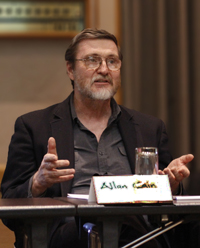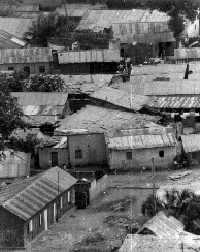The breadth of Angola’s “informal sector”—and its role in the lives of most Angolans— cannot be overstated. Throughout the vast urban musseques of peri-urban Luanda in which approximately 1 in 3 Angolans currently reside, essential services — such as water, food, fuel and transport — are provided largely through private initiative in the informal sector. Moreover, Developmet Workshop research has shown, for most Angolans land has been obtained through informal mechanisms. Notably this is not only the case in rural communities where customary legal practices prevail, but is also the case for the overwhelming majority of Angola’s rapidly growing urban population.
The informal sector grew during the conflict years and in the capital city of Luanda alone was estimated to employ 37% of the entire country’s labour force in 1998, justifying the assessment at the end of the war, in a 2002 UNDP report that “Luanda has become the largest laboratory for survival strategies in the world.” In Luanda strategically-sited urban marketplaces are linked to dozens of smaller satellite markets and eventually street sellers—and dominate the wholesale and retail trade, serving as both a distribution outlet for rural produce and the major source of imported and national products for urban consumers and rural traders alike.
Government policies have often excluded the poor by legislating against the informal sector. Colonial era city bye-laws have been resurrected to prohibit street trading and close down the large informal urban markets. Such policies run counter to the aims of the Government’s own Poverty Reduction Strategies. Policies have been enacted based on prejudice, no contextual investigation and little debate.
DW’s research has provided basic baseline information about the informal market’s structural profile, as well as in-depth knowledge about the dynamics of informal peri-urban markets. DW aims to provide a comprehensive documentation and analysis of the Angolan informal economy and advocate for how it can be transformed in light of the new challenges and opportunities, potentially affecting the livelihoods of the millions of Angolans whose livelihoods depend upon it.
Post-Conflict Transformation in Angola’s Informal Economy 2007 – 2009
From September 2007 to June 2009 Development Workshop has carried out its proposal to expand and build upon its experience of both sector-specific and broad baseline research to develop a …
Read moreRoque Santeiro Informal Market – Informal Market World Atlas 2015
The market of Roque Santeiro emerged as an important centre of the informal economy in Luanda in the 1980s as the government encouraged people who had begun to sell on …
Read moreCarlos Kandov e Niza Roças – Associação dos Vendedores Ambulantes de Angola
Na sexta feira do dia 16 de Maio de 2014 foi realizado nas Instalações do Escritório sede da Development Workshop, mais um espaço do Debate a sexta feira com o …
Read moreMercados Informais de Terra Urbana e Microfinanças para Habitação em Angola
NOVAFRICA, juntamente com o Centro de Pesquisa Econômica e Social da Faculdade de Economia da Universidade Agostinho Neto, realizou um workshop sobre mercados de habitação e urbanização na África sub-saariana. …
Read moreLuanda’s Post-War Land Markets: Reducing Poverty by Promoting Inclusion
Author: Allan Cain. Published in Urban Forum (2013) 24:11–31. This paper presents the results of work on property markets in Luanda that permit a better understanding of the nature and …
Read moreAngolan Informal Peri-Urban Water Sector Report
This report is of a study of the informal water sector in Luanda in the post-war context. The research was an applied research project with a view to advocacy for …
Read moreInformal Trading in Luanda’s Markets, Streets and at Home Report
The informal trading economy began to develop in Luanda in the late 1970s or early 1980s. The second wave of returnees from the Congo/Zaire in the early 1980s appears to …
Read moreAngolan Informal Rental Housing Market Report
p>To date, there has been no research done on rental housing in Angola and as this report will show, there is no government policy concerning rental housing, nor any legal …
Read moreAngola’s Post Conflict Informal Urban Economy – Narrative
Between 2007 and 2009 DW carried out a research program expanding and building upon its strong record of both sector-specific and broad baseline research to begin to develop a comprehensive …
Read moreStudies on Scavenging in the Informal Rubbish Recycling Markets – 1997 & 2005
In 1997, Development Workshop conducted a study on scavenging, a form of recycling waste. This study illustrated that scavenging was a strong income-generating activity for many of Luanda’s residents. In …
Read more





